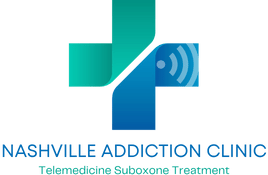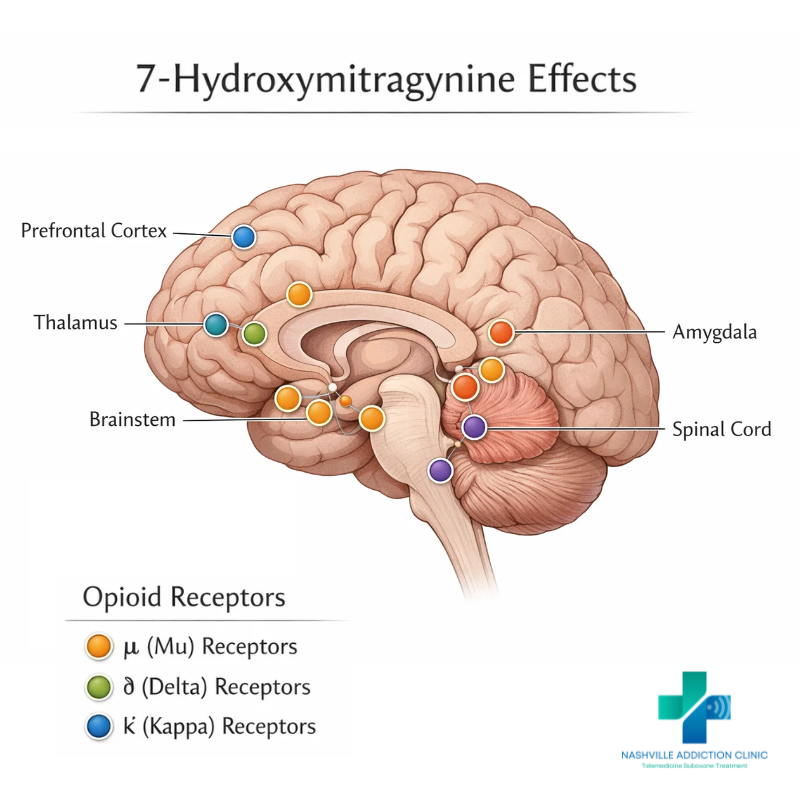What Are the Symptoms of Kratom Withdrawal

If you’re using kratom regularly or heavily, you might be asking: what are the symptoms of kratom withdrawal? This article will explain what to expect, how kratom acts on the body, and how Nashville Addiction Clinic can support you to recover with treatment options like Suboxone via TeleMAT.
What is Kratom & Why Withdrawal Happens
Kratom (Mitragyna speciosa) is an herbal substance from Southeast Asia. It contains alkaloids like mitragynine and 7-hydroxymitragynine that bind in part to the same brain receptors as opioids. (DEA)
According to the FDA, kratom is not approved for any medical use. It is considered a substance of concern due to risks like substance use disorder (SUD), liver toxicity, seizures, and withdrawal symptoms when stopping use. (U.S. Food and Drug Administration) The DEA has recognized kratom as a “drug and chemical of concern.” (congress.gov)
When you use kratom frequently, your body may adjust (tolerance) and become dependent. If you reduce or stop use, your body can undergo what are the symptoms of kratom withdrawal—physical, psychological, or both.
What Are the Symptoms of Kratom Withdrawal
Here’s a breakdown of the common symptoms of kratom withdrawal, compared to opioid withdrawal, including timeline and severity.
Physical Symptoms
- Nausea, vomiting, and stomach cramps or abdominal pain
- Diarrhea
- Sweating (including cold sweats), chills, hot flashes
- Muscle aches, joint pain, restlessness, body tremors or jerky movements of limbs
- Runny nose, watery eyes, yawning
- Loss of appetite, weight loss
- Insomnia or disturbed sleep
Psychological & Emotional Symptoms
- Anxiety, nervousness, agitation
- Depression, low mood, sadness or feeling emotionally “flat”
- Irritability, anger, restlessness
- Cravings for kratom or other substances
Kratom Withdrawal Timeline
Knowing the timeline helps you prepare. Everyone is different, depending on how long and how much kratom was used, and whether other substances (opioids, etc.) are involved.
| Time After Last Use | Likely Symptoms |
| Within 12–24 hours | Early signs: runny nose, watery eyes, anxiety, restlessness, yawning |
| 1–3 days after | Peak of physical symptoms: nausea, vomiting, muscle aches, sweating, chills |
| 4–7 days | Symptoms may start easing; sleep problems, mood swings, craving remain |
| After 1 week | Many physical symptoms decrease; psychological symptoms (depression, cravings) may linger for weeks |
The severity is often milder than full opioid withdrawal, but still serious enough to risk relapse. (PMC)
Kratom Withdrawal vs Opioid Withdrawal
People who used opioids like heroin, fentanyl, oxycodone, or hydrocodone often fear withdrawal intensely. Kratom withdrawal can mimic opioid withdrawal in many ways—because of similar receptor action—but tends to be less severe overall. (PMC)
However, if someone was using kratom in addition to opioids, or if kratom use was very heavy, symptoms can be compounded. That’s why medical supervision often matters.
Risks of Ignoring Withdrawal
Ignoring what are the symptoms of kratom withdrawal can lead to:
- Continued dependence and escalation of use
- Turning back to stronger opioids or unregulated sources (which increases risk of overdose or death)
- Mental health decline: anxiety, depression, possibly suicidal thoughts
- Legal, relationship, work problems
Opioid addiction has high risks—SAMHSA data shows that untreated substance use disorders increase risk of overdose death. Using kratom to self-treat opioid withdrawal or pain can lead into a dangerous cycle. Federal agencies like FDA, DEA, and SAMHSA warn of these risks. (U.S. Food and Drug Administration)
How Nashville Addiction Clinic Helps
At Nashville Addiction Clinic, we bring experienced, compassionate, clinically-driven care to people age 18 to 65 who are struggling with kratom dependence, opioid addiction, or both.
Here’s how we help:
- We pioneered TeleMAT in Tennessee: virtual medication-assisted treatment using Suboxone, counseling, and ongoing clinical care. You never need to come to a clinic in person.
- Over six years in operation, we’ve treated over 1,000 people in Tennessee. We are the first clinic in Tennessee to receive a virtual medical license for treating addiction using telemedicine.
- Over 200 five-star reviews on Google back up our commitment to quality.
- We’re accredited by The Joint Commission.
- Our counseling staff all hold master’s degrees, with years of experience in opioid addiction. Our owners are in active recovery themselves and built this clinic to offer the kindness and respect they needed but didn’t always receive.
Treatment Benefits
- Suboxone is prescribed on the same day as your first appointment, delivered to your local pharmacy or overnight.
- Treatment helps minimize withdrawal symptoms, reduce cravings, lower risk of overdose, and stop the cycle of chasing pills or daily use.
Managing Kratom Withdrawal with Treatment
If you’re wondering what are the symptoms of kratom withdrawal and feeling overwhelmed, here’s how to manage safely:
- Seek medical assessment as soon as possible. Telemedicine options make this accessible even if transportation is unreliable.
- Medication-assisted treatment (MAT): Suboxone (buprenorphine/naloxone) is FDA-approved for opioid use disorder. It’s being used off-label in some settings to ease kratom withdrawal symptoms. (dig.pharmacy.uic.edu)
- Counseling & support: Behavioral therapy, group support, coping strategies help address psychological symptoms, cravings, and relapse risk.
- Monitoring & follow-up: Even after physical symptoms ease, mental health symptoms may linger. Ongoing care is key.
How to Get Started with Us
- If you have commercial health insurance, you can register for virtual addiction treatment using commercial health insurance.
- If you have TennCare Medicaid, you can register for online Suboxone treatment using TennCare Medicaid health insurance.
- If you don’t have insurance or prefer a private pay option, see our self-pay online addiction treatment.
- Want to check insurance details and pricing? We have that clearly listed at Insurance & Pricing.
- Meet our team of caring professionals here: Meet Our Staff.
You can call or text us at (615) 927-7802 with questions—or message us securely on the Spruce Health mobile app.
FAQs
What are the symptoms of kratom withdrawal compared to opioid withdrawal?
They overlap a lot: nausea, diarrhea, muscle aches, mood swings, insomnia, etc. But kratom withdrawal is generally milder and shorter for many people. (PMC)
How long does kratom withdrawal last?
For most people, physical symptoms peak within 1-3 days, start to improve around day 5-7. Psychological symptoms like cravings, depression, anxiety may last longer—several weeks or more.
Can Suboxone help with kratom withdrawal?
Yes. Suboxone is FDA-approved for opioid use disorder and is used off-label in some cases to reduce symptoms of kratom withdrawal. (dig.pharmacy.uic.edu) Nashville Addiction Clinic uses Suboxone as part of our TeleMAT program to make transitions safer and more comfortable.
Is kratom legal and regulated?
As of mid-2025, kratom is not scheduled at the federal level in the US, though 7-OH (7-hydroxymitragynine) is under review by the FDA, which has recommended it be classified as a Schedule I controlled substance. (Stateline) Many states regulate kratom; some ban certain kratom products.
What if I’ve been using kratom PLUS other opioids like fentanyl or heroin?
This can heighten withdrawal severity, risk of overdose, and complications. It’s especially important to seek medical treatment and use MAT coupled with counseling in this scenario.
Recovery: Hope & Next Steps
We understand people in Nashville, Knoxville, Memphis, Chattanooga, or Clarksville often feel trapped—afraid of withdrawal, legal consequences, or being judged. But recovery is possible, and you don’t have to go through this alone.
At Nashville Addiction Clinic, the keys to life-long recovery are a combination of:
- Suboxone to safely ease withdrawal symptoms and cravings
- Counseling with experienced, caring therapists
- A full team of clinicians who respect you, understand your story, and want to help
You deserve to build a stable life—get back to work, be there for your children, feel proud again, be healthy.
Related Articles
- Kratom Withdrawal: Safe, Virtual Recovery Options in Tennessee
- Kratom Addiction Treatment in Tennessee: Virtual Help That Works
- Kratom Side Effects: What Tennessee Residents Need to Know
- Kratom Use Disorder: Understanding Treatment Options in Tennessee
External Resources
- DEA.gov – Opioid addiction-related articles
- National Institute on Drug Abuse
- Substance Abuse and Mental Health Services Administration (SAMHSA)
- Centers for Disease Control and Prevention | CDC.gov
- National Center on Substance Abuse and Child Welfare
- Locate a Peer Recovery Support Specialist
- Tennessee Department of Health Drug Overdose Dashboard
If you or someone you love is going through kratom withdrawal or opioid addiction, you’re not alone. Nashville Addiction Clinic is ready to help. Call or text (615) 927-7802, or reach out via the Spruce Health app today.














